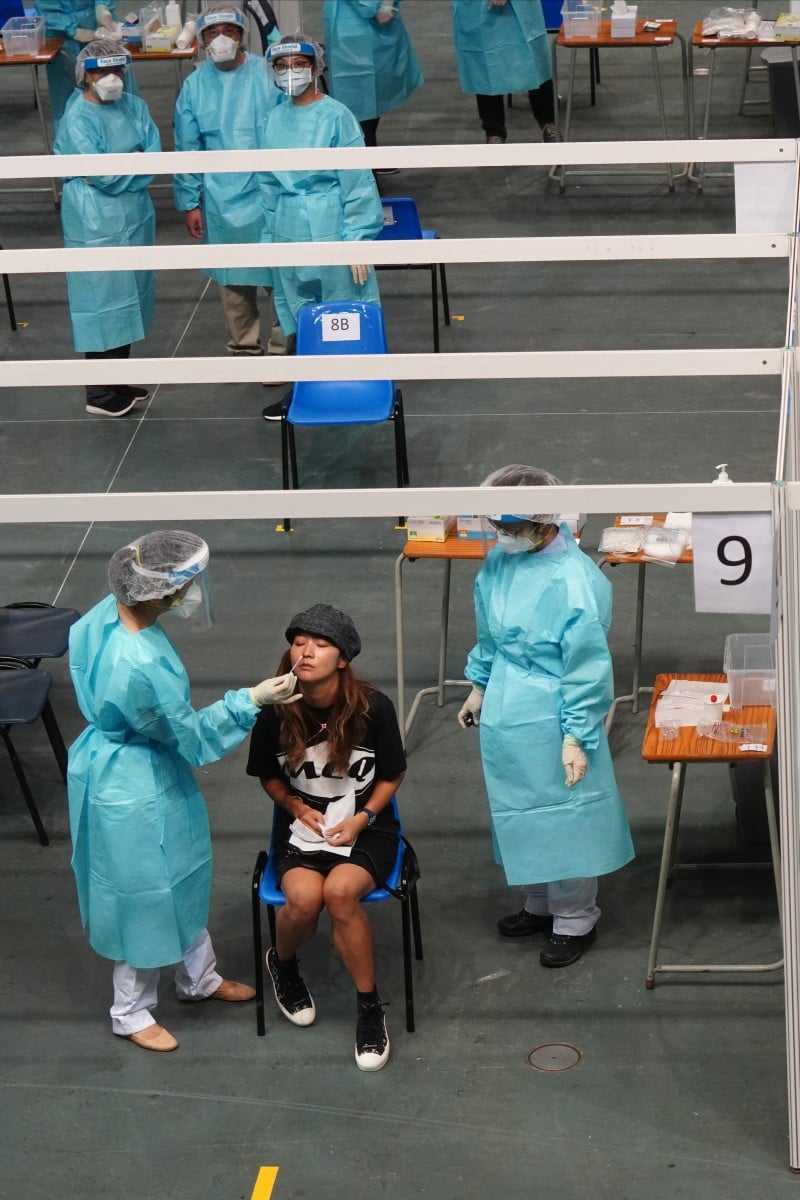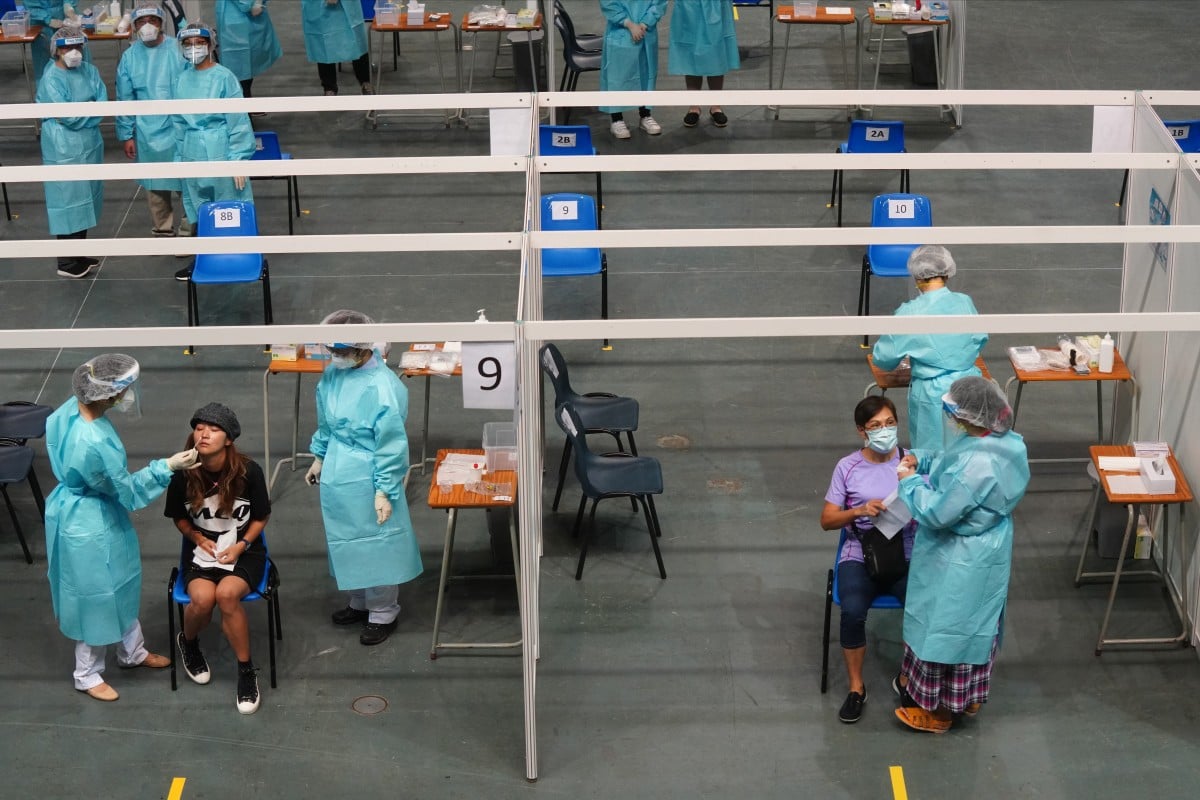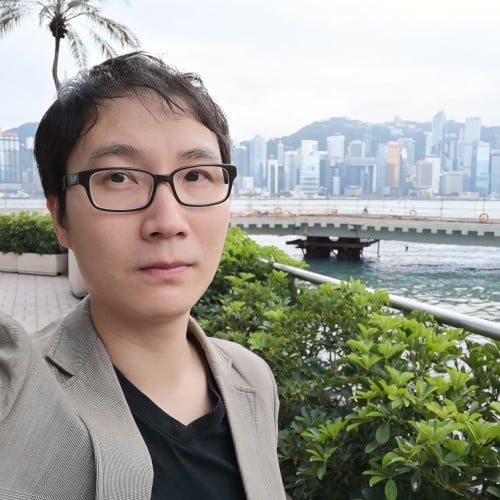
Talking Points: Was Hong Kong’s free mass Covid-19 screening programme a good use of resources?
- Hate it when you can’t talk back? Well, you can with ‘Young Post’. Have your say and share with students around Hong Kong
- Students share their thoughts about the coronavirus testing scheme instituted by the city’s government
 Hong Kong residents take part in the Covid-19 Universal Community Testing programme.
Hong Kong residents take part in the Covid-19 Universal Community Testing programme.Some say it was like throwing money down the drain. I don’t think so. It helped isolate patients who didn’t show symptoms, thereby reducing the number of infections in Hong Kong.
Many people who were afraid that they were infected and may pass on the disease to their family members and friends got tested.
Our priority should be screening out infected people, not using that money to give cash handouts.
The free tests allowed the government to control the spread of the disease and take steps to revive the economy.
As the saying goes, “desperate times need desperate measures”.
I believe the screening programme was introduced for the good of the people and it was a success.
Brian Tong, 16, King Ling College
It was a very good move by the government because the screening programme found coronavirus patients who did not know they had the disease. This prevented the virus from spreading to others and possibly making them seriously ill.
The government spends more money treating Covid-19 patients who have been diagnosed later. Such patients can become very ill, which means the treatment will be very costly. So the free testing scheme was a good way of using resources available to the authorities.
Cynthia Lam, 13, Pope Paul VI College
Students in Japan design anime face masks that shows users’ expression
There is no denying that Hong Kong’s free mass Covid-19 testing scheme helped identify the city’s invisible coronavirus carriers.
Some people have the virus but they don’t know that because they are not sick. So the tests were very important.
What’s more, a team of professionals were hired to carry out the tests so people felt they were safe.
The screening programme helped to reduce coronavirus transmissions and ease the city’s health crisis.
Chow Ching-yin, 14, STFA Leung Kau Kui College
It wasn’t necessary. Of a total of 1.78 million people who took part in Hong Kong’s two-week mass testing scheme, only a few dozen Covid-19 carriers were found. It cost the government about HK$530 million so it was just not worth it.
Also, why didn’t the government carry out the tests when the city’s coronavirus situation was more serious?
British Prime Minister Boris Johnson talked about a very important point – herd immunity. Covid-19 does not pose a huge danger for young adults and teenagers. But the elderly people have to careful. So relying on herd immunity can be useful during this pandemic.
The Covid-19 screening programme didn’t help a lot. What we can do is fight the virus together by wearing masks and following social-distancing rules.
Hayden Leung, 13, King Ling College
The Covid-19 Universal Community Testing programme uncovered a total of 32 confirmed cases.
I might sound impolite, but I really cannot understand why the government introduced the free Covid-19 screening programme.
Firstly, it wasn’t compulsory so the number of participants wasn’t as high as the authorities expected.
Secondly, the test is not useful at all because it only shows whether you have the virus at that moment. What about people catching the disease at work or after meeting their friends or relatives after they take the test?
I, therefore, think the testing scheme was completely useless.
Hailey Ngan, 17, Fung Kai Liu Man Shek Tong Secondary School
No, I don’t think so. I think the resources were wasted. The situation in Hong Kong was already improving by the time it started. We only found 32 confirmed case from the 1.78 million people who did this screening. It was too late to start this programme. Also when we compare the ratio of those patients who have symptoms and those without symptoms, it makes the programme seem even more worthless.
I think the money would have been better used to prevent the virus from entering Hong Kong. This wave was caused by the people who are excluded from testing. This is a loophole, if the money is spend on these people, there would have been no third wave.
Eric Lui, 17, King Ling College
What is the worst thing about having lessons on Zoom?
In my opinion, it is a no.
Let’s start with some statistics: around 1,783,000 citizens participated, but only 32 cases tested positive and the cost was HK$530,000,000.
Solely from the statistics, it already can be clearly seen that it is not worth it. 32 cases is a lot, but I think using such large amount of capital is totally unrealistic. If the government only focused on group screening for vulnerable people, it could have been more effective in isolating the infected and stopping the propagation chain of the virus, bringing the local transmission to a complete halt.
How should the money have been spent then? Here are some suggestions. First of all, support local medical staff, they have been working hard to keep us healthy while risking their lives. Second, the large amount of money could have been put into investigating the virus, its nature, origin or maybe even a vaccine, that would be the final piece of the puzzle to humanity’s victory against the virus.
I can see citizens doing their best to stay healthy. We have worn masks 24/7 outdoors and we have been staying in touch online instead of in person, but I think the government is doing their best here. To stop the cases from soaring again in Hong Kong, we have to possibly cut the flow of people that are coming into Hong Kong for a while. Closing the borders is one of the most effective ways to curb the spread, as seen from the successful example of Taiwan.
Schools have resumed and I think our awareness of the virus has somewhat loosened. Citizens should act responsibly and keep on social distancing and practise good personal hygiene.
Wong Wai-lok, 15, King Ling College
The screening programme a good programme for Hong Kong’s citizens, because there are asymptomatic Covid-19 patients at large in the city. Hopefully, the programme could detect these invisible carriers and bring back peace of mind to the people of Hong Kong.
Venus Wong, 12, Pope Paul VI College
Our topics always get a lot of responses.
Next week’s question: Should Hong Kong students temporarily stop going abroad for university because of Covid-19?
Send your answers to [email protected] before midnight on Monday. Don’t forget to include “Talking Points” in the subject line, as well as your name, age and school.
